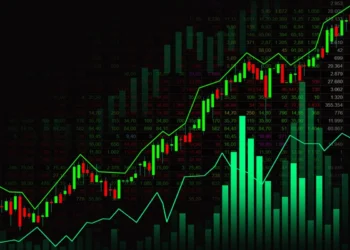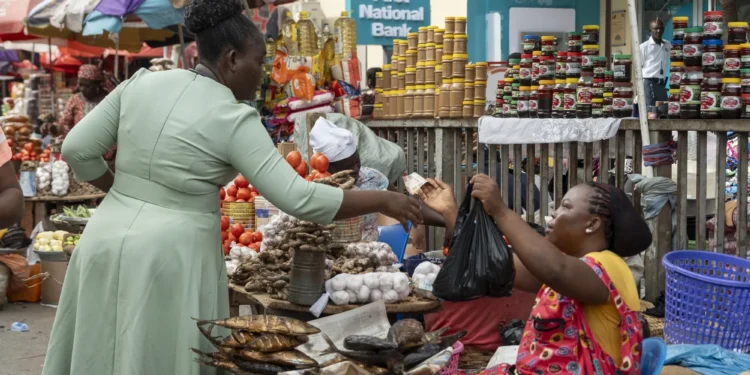The Ghana Stock Exchange (GSE) closed the month of May on a somber note as the benchmark GSE Composite Index (GSE-CI) slipped by 3.2% in the final week of trading.
The decline marks a bearish end to a month characterized by alternating surges and slumps, with investor sentiment tilting toward caution amid macroeconomic and sector-specific uncertainties.
Despite this setback, the GSE-CI still holds firm on a year-to-date basis, recording an impressive gain of 25.81%—a signal of broader investor confidence over the long term.
The GSE-CI, which tracks the performance of all listed companies on the Ghana Stock Exchange, lost 25.56 points or 0.41% in the last trading session of May to close at 6,150.31 points.
This capped a week that saw sustained pressure from profit-taking activities and subdued demand across key equities. The 4-week performance of the index reflected a relatively mild decline of 1.03%, indicating that most of the drag occurred in the final week of the month.
On the other hand, the GSE Financial Stocks Index (GSE-FSI), which measures the performance of listed financial institutions, provided a more optimistic picture.
The FSI posted a modest weekly gain of 1.32% to close at 3,217.14 points, with a 4-week gain of 2.81% and a strong year-to-date appreciation of 35.13%. This trend highlighted the resilience of the financial sector, driven by investor confidence in banking and insurance equities amidst signs of recovery from earlier economic headwinds.
Trading Volume Up, Turnover Down
Trading activity for the final weekday of the month—Friday, May 31—saw notable improvements in market participation. A total of 416,874 shares changed hands, corresponding to a market value of GHS 1,038,337.27.
Compared to the previous trading day (Thursday, May 29), the volume of shares traded rose by 56%, even though the value of turnover dropped by 12%. This divergence suggests that while more shares were traded, they were largely in lower-priced equities or involved smaller transaction sizes.
The market capitalization of the Ghana Stock Exchange at the close of the month stood at GHS 136.5 billion, reflecting the cumulative value of all listed equities. While this figure remained relatively stable, it also highlighted the cautious stance of institutional investors amid macroeconomic tightening and global market fluctuations.
In terms of equity performance, eight listed companies participated in the day’s trading session. The day ended with three gainers and two losers, reinforcing the market’s mixed sentiment.
Leading the pack of gainers was SIC Insurance Company, which posted a 1% increase in its share price to close at GHS 1.01 per share. Guinness Ghana Breweries followed with a 0.83% gain, while GCB Bank edged up slightly by 0.25%.
Conversely, Ecobank Transnational Incorporated emerged as the worst performer for the day, shedding 1.11% of its share value, while MTN Ghana, one of the exchange’s most active and influential stocks, fell by 0.67%. These two equities were pivotal in dragging the composite index lower, with their large market caps amplifying the effect of their declines.
In terms of trading volume, MTN Ghana led with a commanding 305,779 shares traded, underscoring its role as a key liquidity driver on the GSE. Ecobank Transnational followed with 61,438 shares, SIC Insurance recorded 42,313 shares, and GCB Bank saw a modest 2,000 shares traded.
Market analysts observe that the GSE’s performance in May reflects typical investor behavior during periods of earnings adjustments and macroeconomic recalibrations. “The retreat in the composite index is more a reflection of cautious repositioning than a fundamental lack of confidence,” said a local investment analyst. “We expect some degree of volatility to persist into June, especially as investors digest mid-year economic data and corporate disclosures.”
While the final week of May tilted toward the bears, the overall year-to-date performance of the GSE remains encouraging. The 25.81% rise in the GSE-CI since the beginning of the year continues to position the Ghana Stock Exchange as one of the more attractive markets in sub-Saharan Africa, especially as local companies show signs of post-pandemic resilience and operational improvement.
As June is on the horizon, market watchers will be keenly observing macroeconomic signals, dividend announcements, and portfolio reallocations to determine whether the bulls can reclaim dominance or if the bears will continue to exert pressure on the GSE’s momentum.
READ ALSO: Communications Minister Rallies MTN to Support Digital Ecosystem Reforms























